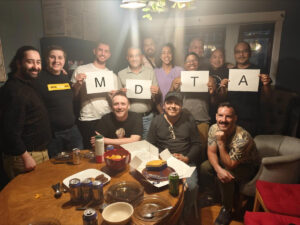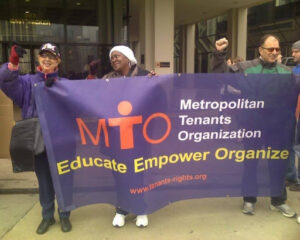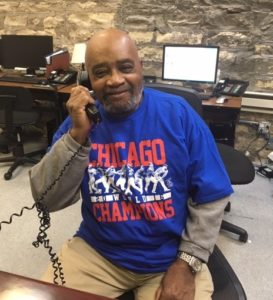 Organizing around tenant rights is about winning through building community and collaboration. We are proud of our work in helping tenants win our consistent victories in the city of Chicago. Check out several of our recent tenant organizing successes in this ever-growing list.
Organizing around tenant rights is about winning through building community and collaboration. We are proud of our work in helping tenants win our consistent victories in the city of Chicago. Check out several of our recent tenant organizing successes in this ever-growing list.
2025
- N Dayton (46th Ward) – Building tenants faced forced relocation due to the landlord’s desire to renovate the building. After forming a tenant union, residents gained rent forgiveness and other benefits.
- More efforts forthcoming!
2024
- S. Stony Island (8th Ward) – Tenants expressed concerns about management and security and wanted to form a tenant association. Tenants organized to form an association and, through direct action, ensured that new security measures were implemented.
- N. Sheridan (48th Ward) – Building tenants faced various safety issues, including fire prevention, bedbugs, and poor building management. Tenants mobilized and formed a union, presenting management with their demands. Results included repairing fire escapes and the building’s elevator and mitigating a severe outbreak of bedbugs.
- S. Daniel Drive (9th Ward) – Tenants organized around the landlord’s reluctance to make necessary repairs. Despite landlord retaliation, tenants organized around holding the landlord accountable. Not only were repairs made, but tenants formed an association to continue efforts to ensure building quality and safety.
- S. Drexel (20th Ward) – Tenants organized to focus on issues of poor property management. After establishing a union, tenants forced landlords to improve security and ensure further cooperation.
- W. Cermak Rd (20th Ward) – After receiving significant rent increases without remediation for healthy home issues, tenants organized to assert their rights. After securing legal counsel and withholding rent, tenants received significant repairs (including windows and floors) and improved pest control efforts.
- S. Champlain (4th Ward) – Tenants organized around health and welfare issues caused by 3500 pounds of sanitary waste and other debris. Results included inspection, engagement of the alderman, and negotiations.
2023
- W 103rd (19th Ward) – New property management company provided no-cause lease terminations for over 100 residents across six buildings. Tenants organized and received rent forgiveness, rental reimbursement, and some received lease extensions for one year.
- E. 79th (6th Ward) – Landlord attempted to intimidate tenants by charging for refrigerators, visiting the property with armed security, and threatening eviction. Thanks to tenant organizing, landlord was forced to make changes including security screen doors, tuck pointing, heat, installing a new stove, and tenant rent forgiveness
- S. Burley (10th Ward) – Tenants organized around issues concerning lack of repairs and the resulting landlord harassment and retaliation. Efforts around organizing resulted in hiring an extermination company, improving security, and increased tenant input on renovation priorities.
- E. 41st St (3rd Ward) – Organizing around efforts to reopen the building’s community room, tenants formed an association to address this and other issues, including smoking in units, ventilation issues, and disrespectful management.
- E. 38th Street (3rd Ward) – Tenants organized around a series of maintenance issues including broken washers and dryers, bedbug infestations, and a flooded community room. Despite landlord harassment and intimidation, tenants successfully organized and had washers and dryers fixed, bedbugs exterminated, and an improved community room with increased attendance.
- N. Hudson (27th Ward) – Forming a union to counter management harassment and security issues, tenants were able to have needed repairs made and improve security.
 HUD tenants recently had concerns about bed bugs, issues with re-certification, retaliation by management, and the use of their community room in their building. Management at first did nothing to resolve the complaints. Tenants called MTO and building organizer David Wilson went to the building and informed them of their rights. Tenants in the Park Shore East building located at 6250 S. Harper then formed an association.
HUD tenants recently had concerns about bed bugs, issues with re-certification, retaliation by management, and the use of their community room in their building. Management at first did nothing to resolve the complaints. Tenants called MTO and building organizer David Wilson went to the building and informed them of their rights. Tenants in the Park Shore East building located at 6250 S. Harper then formed an association. We have good news Chicago! As spring descends on the city and peak moving season approaches, renters in Chicago have a great new tool at their disposal to use our
We have good news Chicago! As spring descends on the city and peak moving season approaches, renters in Chicago have a great new tool at their disposal to use our  I was sad the day I learned that Mr. Green had passed. No one can remember the first day that Mr. Green began volunteering in the MTO office but it was a while ago, before we moved to our current location at 1727 S. Indiana. He first became involved with MTO because his HUD building was in terrible shape and he wanted to start a tenants association. He threw his whole self into organizing the tenants, who then voted him to be the association’s president. The tenants under his leadership gathered for monthly meetings, wrote and met with HUD officials, joined with other HUD tenants and even protested outside of HUD’s offices and in the end, the tenants won many of their demands. HUD paid for the rehab of his entire building.
I was sad the day I learned that Mr. Green had passed. No one can remember the first day that Mr. Green began volunteering in the MTO office but it was a while ago, before we moved to our current location at 1727 S. Indiana. He first became involved with MTO because his HUD building was in terrible shape and he wanted to start a tenants association. He threw his whole self into organizing the tenants, who then voted him to be the association’s president. The tenants under his leadership gathered for monthly meetings, wrote and met with HUD officials, joined with other HUD tenants and even protested outside of HUD’s offices and in the end, the tenants won many of their demands. HUD paid for the rehab of his entire building.
 Mr. Green and the other tenants testified every year at
Mr. Green and the other tenants testified every year at 

